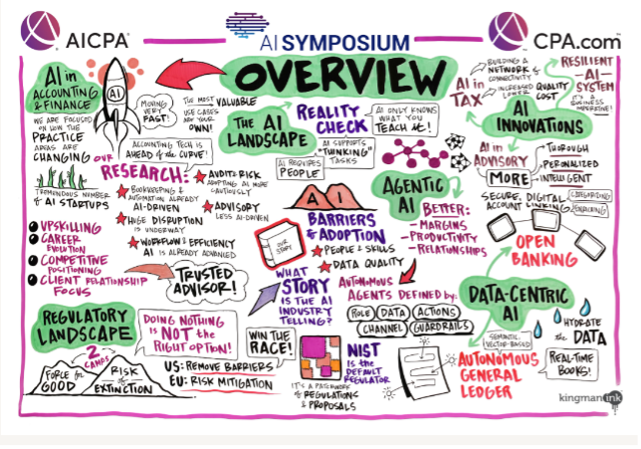At the 2nd annual 2025 AICPA and CPA.com AI in Accounting and Finance Symposium, accounting and finance leaders, technology solution providers, AI experts and regulators came together to discuss the current AI landscape, emerging trends and strategies for the profession to seize and shape the significant opportunities that this transformative technology offers.
Here are a few of the key takeaways from the event:
-
AI adoption is expanding rapidly... though not quite as fast as predicted.
Gartner reports that 58% of finance teams used AI in 2024, up from 37% the year prior. Primary use cases included intelligent process automation, anomaly and error detection, analytics and operational assistance and augmentation.Even so, almost half of teams surveyed reported that the speed of adoption has been slower than expected and only 36% of the use cases proved successful. Common hurdles cited include limited data skills, bad data quality, unclear governance and privacy and security concerns.
Still, the momentum is continuing to build with a continued focus on clearing the roadblocks and the emergence of new advancements and capabilities.
-
Agentic AI is quickly becoming a game changer.
Agentic AI is spearheading the shift away from traditional automation to autonomous agents capable of complex, action-oriented tasks. These agents are no longer just passive tools but active participants in workflows, performing functions like onboarding, document generation, client insights and relationship management. For practitioners, the concept of an unlimited digital labor supply has profound consequences. For one, this evolution redefines productivity—freeing up time from monotonous, repetitive work, and reallocating it to high-value client interactions.With 82% of companies planning to adopt autonomous agents within three years, agentic AI is poised to reshape operational models. However, thoughtful design, robust data governance and clear handoff protocols between AI and humans are essential to maintain trust, accuracy and security—cornerstones of the accounting profession.
-
Regulation remains inconsistent.
Without guardrails, potential users may hesitate to experiment with AI. At the same time, overregulation could just as easily slow progress. Right now, regulatory approaches vary widely across global, federal and state levels, creating a messy patchwork of rules that organizations have to navigate. In the U.S. alone, hundreds of AI-related bills are in play, many of them conflicting. The measures most likely to move forward will probably focus on security rather than how AI can or should be used. CPAs can help shape the future by working with lawmakers and advocating for thoughtful, balanced regulation. -
Accounting technology is ahead of the curve.
The accounting technology ecosystem is ripe with innovation, with solution providers actively integrating AI into their platforms to drive greater efficiencies and new opportunities. Meanwhile, new startups—such as those that are part of the AICPA and CPA.com Startup Accelerator program—are emerging daily and filling the gaps with cutting-edge tools and use cases that are allowing accounting and finance practitioners to experiment with AI and further build on their roles as trusted advisors. -
AI is enabling the transformation of practice areas.
Early AI wins have largely focused on automating tasks like managing marketing workflows, drafting emails and other day-to-day administrative work. But there’s also a lot of opportunity within each practice area emerging to shift into more meaningful, higher-value services:Tax. Firms are using AI agents to handle everything from preparing provisions and managing tax notices to streamlining sales and use tax classification. These tools not only save time, but also increase accuracy, provide audit-ready transparency and allow tax professionals to focus on higher-value advisory work. This is resulting in a shift away from hourly billing to outcome-based pricing.
Client advisory services (CAS). AI is the catalyst for the next evolution of CAS, enabling automation of inputs and transactional tasks, deeper insights, more personalized solutions and continuous engagement models. Furthermore, with the ability to analyze vast amounts of structured and unstructured data, AI supports better forecasting, scenario planning and due diligence, helping advisors deliver smarter, more context-aware recommendations. This transformation allows firms to scale their expertise, reduce reliance on large teams and offer more value-driven, tech-enabled services to clients.
Audit and assurance. New guidance is being developed to help audit professionals evaluate the risks introduced when clients use AI in financial reporting, from direct applications like estimates to indirect effects through compliance or operational changes. AI is also prompting auditors to adapt traditional methods, with a growing emphasis on understanding governance, model training and control environments—especially as automated AI-driven systems become more common. Looking ahead, CPAs are positioning themselves to provide assurance not just on financials, but also on the functionality of AI systems themselves.
Finance. AI adoption is steadily growing among finance teams that are leveraging it to boost efficiency and elevate the quality of their work. And that trend shows no signs of slowing. By 2028, Gartner predicts that 68% of finance teams will be using AI-enabled scenario planning and 70% will use AI analysis for real-time and improved decision-making on operational cost and cash flow management. Soon, staff will have shared jobs in which AI and a person work together in a single role.
-
Trust will be a critical factor in AI success.
There’s a general consensus that no matter how far AI can take us, the human touch will always be an important factor in ensuring issues such as the accuracy and appropriateness of its efforts. The accounting and finance profession’s long-standing reputation as trusted business partners perfectly positions CPAs to drive broader acceptance of AI and maximize its benefits.Maximizing the AI potential.
For firms and finance teams to get the most out of their AI strategy and adoption, there are a few key areas they need to focus on:Cultivating AI skills—starting early and continuing throughout their careers
Rethinking roles and career paths as the tech keeps evolving
Building resilient AI systems—creating adaptive AI models, managing evolving regulatory demands and ensuring data privacy and transparency
Positioning the firm to stay competitive and take advantage of all the benefits AI can bring
Always keeping the focus on delivering value and strengthening client relationships
One thing is for certain: With an intentional approach to implementing the right technologies in the right way, the future of the AI-enabled accounting and finance profession is bright.
What’s next?
In the coming weeks, CPA.com will release additional resources to help you stay ahead of the fast-changing AI landscape, including an upcoming trends report and the launch of a new AI-focused newsletter. You can subscribe now to receive updates straight to your inbox.In the meantime, here are additional tools to help empower your AI journey.


